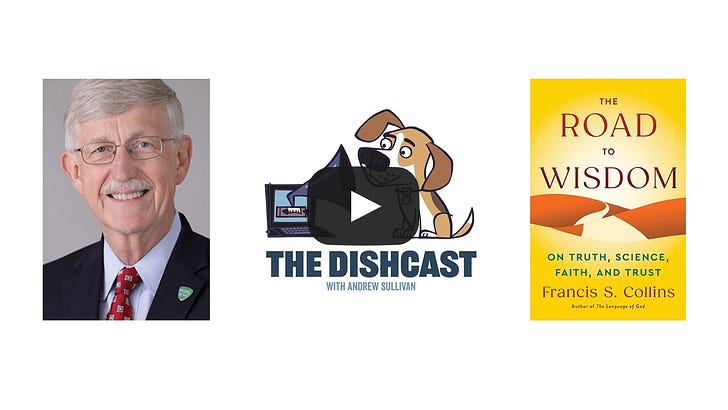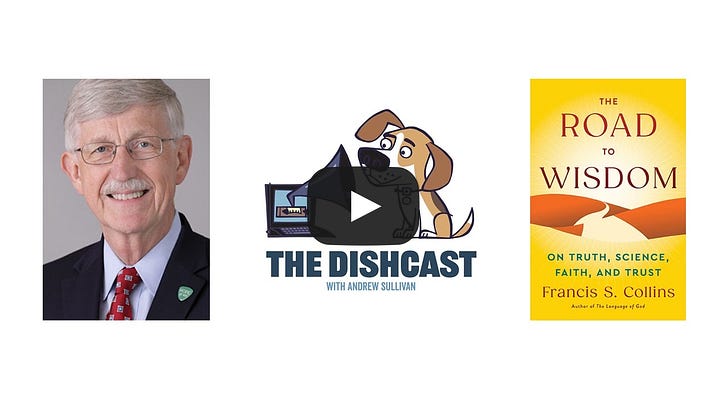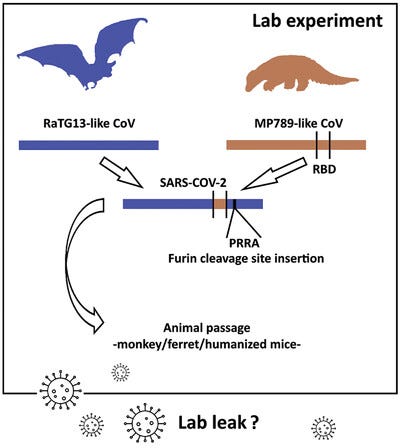Frances Lee is Professor of Politics and Public Affairs at Princeton, and her books include The Limits of Party: Congress and Lawmaking in a Polarized Age. Steve Macedo —an old friend from Harvard — is the Laurance S. Rockefeller Professor of Politics and the University Center for Human Values at Princeton, and his books include Just Married: Same-Sex Couples, Monogamy, and the Future of Marriage. The book they just co-wrote is called In Covid’s Wake: How Our Politics Failed Us. It’s a must-read right now — accessible, elegantly written and, in the end, a devastating indictment of our politics.
For two clips of our convo — on the demonization of dissent during Covid, and where the right went wrong on the pandemic — head to our YouTube page.
Other topics: Frances raised in the Deep South; Steve from a family of educators in Massachusetts; his Jesuit schooling as a gay Catholic; how both were natural contrarians; the pre-pandemic plans for Covid; their personal reactions to the outbreak; the emergency after 9/11; the Spanish flu; the cost/benefit of lockdowns; the different reactions in red and blue states; the Sweden model; trillions of dollars in Covid relief; Fauci’s appeal to authority; Partygate and Newsom’s French Laundry; the remote work enjoyed by elites; how blue-collar workers bore the brunt; the generational injustice suffered by kids; Operation Warp Speed; the early myths of the vaccine; the Ptown vaccinated outbreak; censorship on social media; the moralizing of the MSM; the public-health hypocrisy on BLM protests; mask mandates after the vaccines; how boosters weren’t backed by good evidence; the Great Barrington Declaration; the Ebright testimony; the “Proximal Origin” paper; gain of function and the short-lived moratorium; the illiberal mistakes of Francis Collins; addressing his claims on lab leak; and the alarming current risks of viral escape.
Browse the Dishcast archive for an episode you might enjoy (the first 102 are free in their entirety — subscribe to get everything else). Coming up: Byron York on Trump 2.0, Claire Lehmann on the woke right, Robert Merry on President McKinley, Sam Tanenhaus on Bill Buckley, Jake Tapper and Alex Thompson on the Biden years, and Paul Elie on his book The Last Supper: Art, Faith, Sex, and Controversy in the 1980s. Please send any guest recs, dissents, and other comments to dish@andrewsullivan.com.
From a fan of last week’s pod with Francis Collins:
I was surprised that you were able to score an interview with Collins! Thank you for a terrific and thought-provoking interview. Your questions were brilliant and incisive, but your expectations were off. Asking someone so invested in the NIH narrative such things is a bit like asking a parent if they’ve abused their child. The answer you get from everyone is 100% no, even though the truth is sometimes different.
Sure, you can *ask*, but only a credulous and toxic optimist would say, “Oh, okay, if you say so, then I won’t be skeptical.” When the risks of being honest include vast personal catastrophe, you can’t rely on an appeal to personal integrity. Overall his position seemed to be, “I can argue that I don’t fully know, so I’ll pick the most flattering answer based on the available technicalities.”
Another fan of the episode:
I appreciate the thoroughness that you brought to the interview, especially the discussion on Covid origins and how many in scientific leadership let us down. Badly. You were very fair in your questions to Collins and gently prodded, and this was an extremely valuable insight into his perspective. I do feel he missed the point regarding leadership responsibilities to the public, and did a lot of ass-covering.
But a thank you to Collins, and you, for openly and honestly sharing your personal spiritual journeys. We need more people like that in these dark times.
I’m not going to deny that this one was a challenge. I deeply respect Collins’ work and faith but it’s also my duty to ask difficult questions. I don’t want the Dishcast to be an inquisition, but I don’t want to be Lex Fridman either.
Next up, “a long-time listener/reader, first-time writer”:
It was so refreshing to hear two people who don’t necessarily agree have a reasoned, civil conversation. It’s a truly refreshing alternative to the vast majority of most prominent public discourse.

On the topic of faith, I found your conversation very inspiring — so inspiring, in fact, that I plan to attend my first Easter Sunday service in recent memory this Sunday. I was raised Catholic and attended Catholic school — altar boy pageantry and all! But my young rebellious years and burgeoning homosexuality — coupled with the numerous scandals that plagued the Catholic institution — turned me away from actively practicing my Catholic faith much beyond high school.
I am now in my early 40s, rediscovering myself again, as it were, and seeking a renewed purpose and sense of meaning in a world that increasingly seems senseless, cruel, and ephemeral. The Dishcast, and the conversations like this one with Collins, have been my weekly grounding in something deeper and meaningful. Thank you for all of the wonderful guests and conversations. Wishing you a happy Easter.
Well that made my day. Another listener gets into lab leak:
A deep concern of mine about our response to Covid was that the line between public policy making and science became sadly blurred. “Follow the science” is of course nonsense; pure science is agnostic about our best interests. Science should be merely one of many factors informing public policy, but timid leaders and hubristic scientists made the path we took perhaps inevitable.
No one should have been better equipped to wisely navigate this confusion than Dr Collins, but he did not, perhaps with tragic consequences. I believe you gave him his best possible venue to present his case and left it to listeners to decide if his case was persuasive. That’s OK with me.
It does seem he gave himself away at the end when he observed that both the wet market theory and the lab leak theory would implicate the Chinese government. This was after insisting that the political implications of publicly siding with the lab leak theory were self-evident. But if both theories implicate the Chinese, why would persisting in support of the wet market theory not also be politically fraught? I think it’s clear. The real political danger associated with the lab leak theory is that it implicates American science as well.
I have long thought Dr Collins is a good man. I still do. But I think the record shows that he made grave errors in suppressing much needed public policy discourse at critical times.
Another sides with Collins:

I think this conversation was very revealing. It does go to show that even those people who are at the center of things may not have all of the answers or know all of the details. Thinking about who I will trust — the intelligence agencies or the virologists — it depends on the subject matter. An intel agency has more expertise about the politics and the way the government operates. A virologist has more expertise about the nature of the virus. I am persuaded by Collins’ comment, “So counter to what you’re saying, if you ask practicing virologists, what do they think? They think this was natural.”
I am also very suspicious about the analysis of the private emails surrounding the “Proximal Origin” paper. I am reminded of the controversy in 2009 that became known as Climategate. This was a valuable lesson in how to misinterpret private emails in the worst possible light.
My reaction to the way Covid was handled was that the scientists did the best they could under the circumstances. And it’s important to note that the circumstances were during the first Trump administration. And under those circumstances, the truth had to struggle against almost insurmountable odds.
Given a choice between who to trust — Anthony Fauci and Francis Collins, or the political operatives they were dealing with — Tony and Francis win, hands down. And I am left unpersuaded by the intelligence agencies. I am not implying malign intent, but the evidence is still circumstantial. So I would disagree that the lab-leak theory is the most likely explanation.
An expert sounds off:
I know more about lab leak than almost all people in the world and have published a few papers on the topic. It’s a classic conspiracy theory — and I don’t use “conspiracy theory” lightly. I can go into detail and answer questions if you like, but for now, I’ll just say that the consensus lab leak theory in 2020-2021 was unambiguously disproven in September 2021. You probably have no idea what I’m talking about here, because that’s how conspiracy theories work; you don’t hear about contradictory evidence from conspiracy theorists.
You should check out the stuff Alina Chan and Matt Ridley deleted from Viral — their lab leak book — between editions when it was no longer true. It’s infinitely more dishonest than anything you figure scientists did to downplay “lab leak” origins:
In between the two editions: (1) the singular association between the Wuhan Institute of Virology and a cave in Yunnan province where the most closely related virus to SARS-CoV-2 was no longer the case, so it was deleted; (2) the second of the two early lineages of SARS-CoV-2 was found in Huanan market in the same corner of the market with animals that can be infected by an transmit SARS-CoV-2, including two species infected in a market with SARS in 2003, so “not detected at” was deleted.
The picture below is the graphical abstract of a paper showing what I consider the consensus lab leak hypothesis that coalesced 2020-2021 from this paper — the theory that SARS-CoV-2 is a chimera of an unpublished bat virus (blue part) and an unpublished fragment of a pangolin virus (brown part):
This is what was unambiguously disproven in September 2021 with this paper (preprinted in Sept 2021 and published a bit later), which found very high identity between SARS-CoV-2 and a new bat virus genome BANAL-20-52 (the yellow line in Fig 1c) found in Laos. Some “lab leak” proponents decided the contradictory data must be fake. Others, like Chan and Ridley, decided to just replace “Mojiang mine” with “Laos” and not bother acknowledging that this was a bit of a problem for a theory that previously hinged on a single cave! That was short-sighted, because additional similar viruses have been found subsequently in Vietnam, elsewhere in China, and most recently in Cambodia (in a preprint last week).
Betting against natural selection being the explanation — when it’s very plausible, and the only argument against is “God of the gaps” — does not tend to pan out as the evidence comes in. All that’s left now is a 12-nucleotide gap, and there are at least five different smoking guns that’ve been proposed to fill the gap with a mad scientist.
Another hint of conspiracy theory is to ask anyone who says “lab leak” is more likely to describe their origins theory as specifically as possible, show how it explains available evidence, and show how it is falsifiable. I’ve literally never gotten anyone to answer these questions. Conversely, the market origin hypothesis was first posted by a random Wuhan citizen and is easily falsified, but it’s passed every single test as new data is published.
The introduction to my new paper very concisely lays out the case for origin in the wildlife industry. It also describes very important new data. Two weeks later, no one in the “lab leak” community has dared to look at the data after reading the title of the paper: “An updated dataset of early SARS-CoV-2 diversity supports a wildlife market origin.”
Obviously, I don’t have the expertise to judge what our reader is saying. But I’m happy to air this dissent — and leave it to readers to make their own mind up.
Here’s another expert — “a computational microbiologist who has looked closely into the issue of the origins of COVID-19 from all sides”:
You wrote, “But how do we know these were the first cases? Without full Chinese transparency it’s impossible for certain.”
But there are many reasons why this isn’t true. The best is because the phylogenetics of the virus indicates that very few people, if any, could have been infected prior to the wet market outbreak. This is because if more people had been infected, we would see more mutations in the virus. This is called the “molecular clock.” We can estimate the absolute maximum number of people who could have possibly been infected prior to the wet market outbreak as 1-18 — on average, 3.
Most likely nobody was infected prior to the market outbreak, because it began there. Thinking about that upper limit, it’s extremely unlikely for a transmission chain beginning at the Wuhan Institute of Virology to have resulted in an outbreak at the wet market selling the same animals that started SARS on the opposite side of the city of 11 million people in just 18 infections.
You also wrote: “By the way, every Western intelligence service is now on my side of the question. Nothing is provable without Chinese transparency.”
This isn’t true, actually! (Even if it’s just an exaggeration.) Recall that the ODNI report found that only one intel agency (known to be the FBI) found a lab origin as more likely — so with the DOE and Trump’s CIA, that’s now 3/8. But still a minority. Of course, I imagine under Trump this will become the position of any political elements of the US government, but hopefully we can agree that is not a sign of, any er, “intelligence”.
You also wrote that MI6 and DIA have concluded a lab origin is more likely, but that is actually not true at all of either organization. If you would like, diving into how you incorrectly came to that conclusion might help reveal more general aspects of how the politics and the media are getting this issue so wrong.
I would enjoy having a conversation about the topic to try to help you understand why 80% of scientists believe that zoonosis is more likely and why those of us who have studied the question even more closely believe a lab origin is extremely unlikely.
Some problems with this email. The web link for “even more closely” goes to a 2024 paper written by Edward C. Holmes — one of the authors of the “Proximal Origin” paper! The ODNI report the reader cites is from 2023, and has been overtaken by other news. And notice how he calls it “Trump’s CIA.” In fact, the CIA reached this conclusion under Biden, and it became public on January 27 this year. Why politicize something like this? Here is the MI6 document from early 2020 arguing that a lab leak was “beyond reasonable doubt.” The German BND says the same. Ditto the DIA.
I don’t need to have a conversation to “try to help me understand why 80% of scientists believe that zoonosis is more likely.” I can read. The email reeks of the same arrogance and condescension to the public that has ruined science’s reputation.
The debate continues with this listener:
Good on you, Andrew, for trying to go toe-to-toe with Francis Collins about the WIV lab-leak plausibility. When put on the spot, it felt to me that Collins was using obfuscation, misdirection, and blatant gaslighting...







